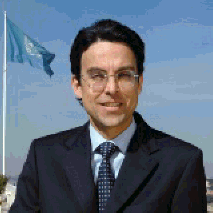|
|
Shakeel BhattiSecretary |
Dr. Shakeel Bhatti is the first Secretary of the International Treaty on Plant Genetic Resources for Food and Agriculture (IT-PGRFA) at the FAO. Since he began in 2007, Dr Bhatti operationalized the first multilaterally governed, global genepool which now contains more than 1.2 million samples of plant genetic material and facilitates more than 600 transfers of genetic material daily from international genebanks alone. The genepool includes the world’s 64 most important food crops – e.g., potato, rice, wheat and maize - which together form the basis of 80% of our food from plants. To make the genepool functional worldwide, Dr Bhatti led the development of a global information infrastructure, the application and interpretation of a standard contract for genetic transfers, and the development of dispute resolutions procedures for this genepool. The Multilateral System of Access and Benefit-sharing (MLS) of the Treaty, which establishes this genepool, is now being looked upon as a reference model for access and benefit-sharing systems being developed by the CBD, WHO and UNCLOS.
Besides the genepool, Shakeel Bhatti also established and facilitated the launch of the Benefit-sharing Fund of the Treaty by initiating the grant of benefit-sharing projects for half a million USD to support conservation of plant genetic resources in developing countries. He facilitated the development of a Strategic Plan for 116 million USD to capitalize the Fund, with a working target of 50 million USD in the next five years. The Treaty’s Benefit-sharing Fund has thus for the first time made international commercial benefit-sharing for genetic resources a practical reality within a binding international legal framework and is now being taken as a model for animal genetic resources at FAO and other processes.
Before creating the Treaty Secretariat, Shakeel Bhatti was Head of the Genetic Resources, Biotechnology and Associated Traditional Knowledge Section at WIPO. He was responsible for WIPO’s work on intellectual property law in relation to genetic resources, biodiversity, traditional knowledge and biotechnology. Shakeel Bhatti represented the WIPO in the CBD, FAO, UNEP, WHO and WTO, in negotiations which led to the CBD Bonn Guidelines on Access to Genetic Resources, the International Treaty, and the CBD Biosafety Protocol. Before joining WIPO, Dr Bhatti worked on his doctorate at Duke University, USA, regarding the scope of patentable subject matter under Article 27 of the TRIPS Agreement in relation to genetic resources and biotechnological inventions. He is currently completing a second PhD on bioethics, biotechnology patenting and the right to food.
Shakeel Bhatti has taught international patent law and genetic resource policy at several universities in India, Japan and Sweden, including the National Law School of India University in Bangalore, Center for Intellectual Property Rights Studies of Cochin University, Swedish Agricultural University and at other institutions. He is a member of the Expert Group on Rights to Plant Genetic Resources and Traditional Knowledge at the World Trade Institute and the Social Science Research Council Expert Group on Intellectual Property Rights and Cultural Flows. His articles appear in several journals and books, such as the Handbook on Plant Biotechnology, published by Wiley and Sons.
